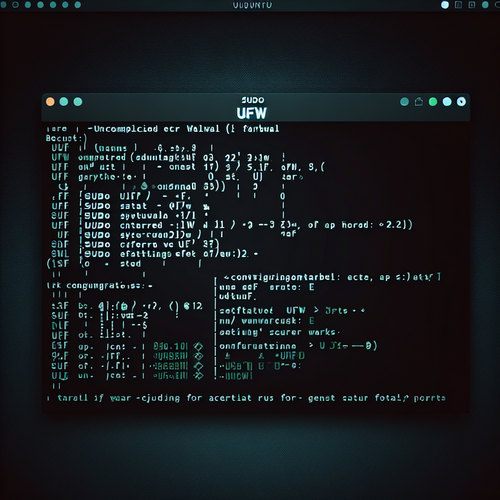
{{ $('Map tags to IDs').item.json.title }}
Using ufw to Configure Firewall Rules on Ubuntu
The Uncomplicated Firewall (UFW) is an easy-to-use frontend for managing firewall rules on Ubuntu and other Linux distributions. This tutorial will guide you through using UFW to configure firewall rules effectively, enhancing your system’s security.
Prerequisites
- A system running Ubuntu with terminal access.
- Root or sudo privileges to modify firewall settings.
1. Installing UFW
UFW is typically installed by default on Ubuntu systems. To check if it is installed, run:
sudo ufw statusIf UFW is not installed, you can install it using:
sudo apt update
sudo apt install ufw -y2. Enabling UFW
To enable UFW, use the following command:
sudo ufw enableYou will see a confirmation message indicating that UFW has been enabled.
3. Checking UFW Status
To check the current status and configuration of UFW, run:
sudo ufw statusThis will display the firewall’s current status (active/inactive) and the currently configured rules.
4. Allowing and Denying Traffic
To allow specific traffic through the firewall, use:
sudo ufw allow [service/port]For example, to allow SSH traffic on port 22:
sudo ufw allow sshOr specify a port explicitly:
sudo ufw allow 22To deny traffic, use:
sudo ufw deny [service/port]5. Allowing Specific IP Addresses
You can allow traffic from specific IP addresses with:
sudo ufw allow from [IP_ADDRESS]Replace [IP_ADDRESS] with the IP you want to allow.
6. Deleting Rules
If you need to remove a rule, you can do so with:
sudo ufw delete allow [service/port]7. Finalizing Firewall Rules
To reload the UFW configurations and ensure all rules are applied, run:
sudo ufw reload8. Disabling UFW
If you ever need to disable UFW, use the following command:
sudo ufw disableThis will turn off the firewall.
9. Logging and Monitoring
To enable logging in UFW to monitor firewall activity, run:
sudo ufw logging onLogs can be viewed in the /var/log/ufw.log file.
10. Conclusion
By using UFW, you can easily configure and manage firewall rules on your Ubuntu system, significantly improving its security. Regularly review and update your firewall settings to adapt to your network requirements.













